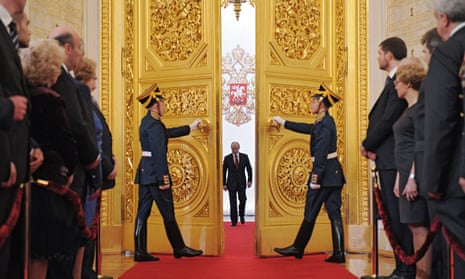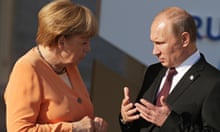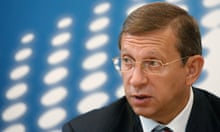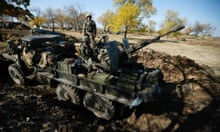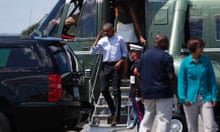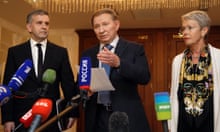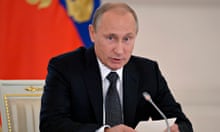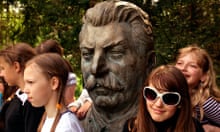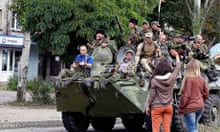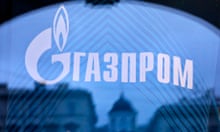The European Union must develop a 10-year plan for Ukraine. This plan will also define what Europe itself will be a decade hence. In tribute to Europe’s pivotal politician, who has clearly led Europe’s evolving policy towards Ukraine, we might call it the Merkel plan. If it succeeds, a characteristically European version of liberal order will have prevailed over the conservative, nationalist recipe for permanent, violent disorder represented by Vladimir Putin. If it fails, Europe fails again.
Our plan should have three main prongs – military, political and economic – each of them with multiple components, all to be adapted as circumstances change. The US has its part to play, but in a supporting, not leading, role.
To have a plan, we Europeans must know what we are responding to. This is difficult, since Putin is in the erratic, hubristic mental state typical of your late-period autocrat. Nonetheless, my best guess is that what he currently aims to do is to keep southeastern Ukraine in such a state of turmoil, divided power and Russian influence that the country as a whole cannot consolidate its position as a sovereign, functioning state – let alone move closer to the EU and Nato. Crucial to this strategy is a porous Russian-Ukrainian frontier, through which Russian arms and agitators can move at will.
This was not Putin’s original idea. He wanted a whole client state inside his Eurasian Union, not half a ruined house. But he seems to be falling back on what in the post-Soviet world has come to be known as the “frozen conflict” option. How, then, to respond to it, while keeping our eyes wide open for both worse and better possibilities?
Some have argued for an escalation of military support to the Ukrainian armed forces, so they are in a position to win. Morally, that seems justifiable. Realistically, it won’t work. Following reforms of the Russian military over the past six years Putin has modernised, effective forces just across the frontier, and his generals have thought hard about the new forms of covert, undeclared warfare they have practised rather successfully in Crimea and eastern Ukraine.
You cannot transform Ukraine’s own military overnight by equipment transfer and training, any more than you can turn a battered old Lada into a BMW simply by inserting a BMW gearbox and hiring a German mechanic. Unless Washington is prepared to wage an undeclared war against a still nuclear-armed Russia, Moscow will have what strategists call escalation dominance. Putin can always up the ante, and has shown that he will.
Nonetheless, western countries should deliver carefully selected equipment, supplies and training to the Ukrainian military, and not least to their frontier forces. In the longer term, one of the keys to ensuring that Putin does not get his “frozen conflict” is to close that frontier. Nato as a whole must also make it plain that no such Russian covert military or paramilitary tricks will be allowed on any square centimetre of Nato territory – and that includes places such as the largely Russian-populated Estonian city of Narva, hard by the Estonian-Russian frontier.
Diplomatic and political negotiations should be tried whenever possible. But the chances of reaching a constitutional settlement in eastern Ukraine that is acceptable to both Putin’s Russia and Kiev’s Ukraine are small. None of the sides can agree what is meant by words like decentralisation, federalisation or “special status”, and to which areas they apply. (“Ukraine is free to adopt any law it wants,” one rebel leader in Donetsk told AFP, “but we are not planning any federalism with Ukraine.”)
More fundamentally, Putin cannot actually want a stable, peaceful, durable settlement, since this would allow Ukraine to function as a federal state, capable of coming closer to the EU. He and his supporters may care about the fate of those they see as Russians in neighbouring states; but Putin’s great game is geopolitics, not the detail of local minority rights.
Meanwhile, Europe can make other political moves. Now the European and Ukrainian parliaments have simultaneously ratified the EU-Ukraine association agreement, the EU must help Ukraine to become a halfway properly functioning state. In terms of influencing the Russian-speaking Ukrainian public, the single most effective step the EU could take would be to move towards visa-free travel for most Ukrainians. All experience from post-communist eastern Europe suggests this is what turns opinion fastest, but it is of course a huge ask for an immigration-wary western Europe.
In return for such major incentives, the Ukrainians must get serious about reforming their own state. First and foremost, this means fighting the grotesque corruption that has been the stock in trade of post-Soviet Ukrainian politics. That has to change.
As for Russia, one thing we must never forget is that, for all his current popularity, Putin is not Russia and Russia is not Putin. In whatever we say and do, we should keep returning to that vital distinction. And, sometime over these next 10 years, Putin will go.
Will stronger economic sanctions on the Putin regime hasten that end? The sanctions are already beginning to bite, even on large Russian energy companies such as Rosneft, but in the short term a propaganda-enhanced siege mentality may even reinforce Putin’s position. In the long term, however, sanctions will erode his base. Gradually, over a matter of years, Russians will make pragmatic calculations of their own best interest. The individual family purse will prevail over the collective imperial heart.
That will be especially true if Ukraine is seen to be prospering while Russia is not. The difficult balancing act of developing Ukraine’s trade and investment relationship with the EU, while not disrupting its close economic ties with Russia, will be crucial to that prospering. Last week’s pragmatic agreement to delay the implementation of the EU-Ukraine free-trade pact earns time to work this out as best we can.
Then there is energy. Roughly half of Russia’s federal revenues come from oil and gas. At present much of Europe depends on that Russian fuel to keep its lights on. If the EU works towards energy independence, which requires networked energy interdependence between EU member states, the balance of power between Russia and Europe shifts decisively. In helping Ukraine, Europe helps itself.
These are just a few suggestions for a 10-year plan. Disagree with some, make others of your own. What’s certain is that Europe needs such a plan; that it will have many components, not just one or two big bangs; that its main instruments will be economic and political rather than military; that it must combine strategic constancy with tactical flexibility; and that it will take a long time to succeed.
If Europe has the vision, will and patience, then the result will bring to mind the old fable of the cold east wind and the sun taking a bet about who can get a thick coat off a passing man. The east wind blows and blows, and the man just wraps the coat more tightly around his shivering body. Then the sun shines and shines, and eventually the perspiring man throws off his coat.
